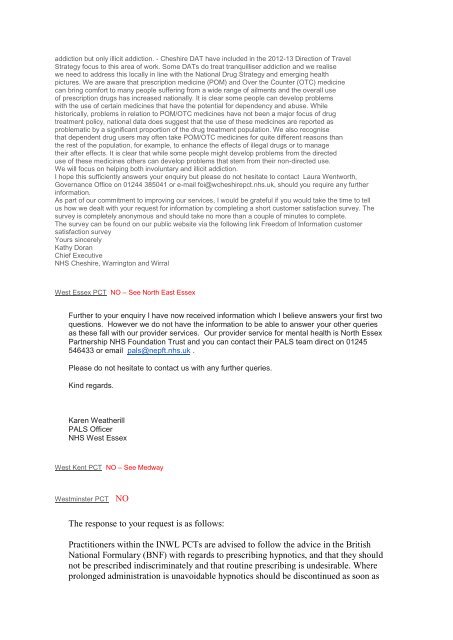Survey of services John Perrott - APPGITA
Survey of services John Perrott - APPGITA
Survey of services John Perrott - APPGITA
Create successful ePaper yourself
Turn your PDF publications into a flip-book with our unique Google optimized e-Paper software.
addiction but only illicit addiction. - Cheshire DAT have included in the 2012-13 Direction <strong>of</strong> Travel<br />
Strategy focus to this area <strong>of</strong> work. Some DATs do treat tranquilliser addiction and we realise<br />
we need to address this locally in line with the National Drug Strategy and emerging health<br />
pictures. We are aware that prescription medicine (POM) and Over the Counter (OTC) medicine<br />
can bring comfort to many people suffering from a wide range <strong>of</strong> ailments and the overall use<br />
<strong>of</strong> prescription drugs has increased nationally. It is clear some people can develop problems<br />
with the use <strong>of</strong> certain medicines that have the potential for dependency and abuse. While<br />
historically, problems in relation to POM/OTC medicines have not been a major focus <strong>of</strong> drug<br />
treatment policy, national data does suggest that the use <strong>of</strong> these medicines are reported as<br />
problematic by a significant proportion <strong>of</strong> the drug treatment population. We also recognise<br />
that dependent drug users may <strong>of</strong>ten take POM/OTC medicines for quite different reasons than<br />
the rest <strong>of</strong> the population, for example, to enhance the effects <strong>of</strong> illegal drugs or to manage<br />
their after effects. It is clear that while some people might develop problems from the directed<br />
use <strong>of</strong> these medicines others can develop problems that stem from their non-directed use.<br />
We will focus on helping both involuntary and illicit addiction.<br />
I hope this sufficiently answers your enquiry but please do not hesitate to contact Laura Wentworth,<br />
Governance Office on 01244 385041 or e-mail foi@wcheshirepct.nhs.uk, should you require any further<br />
information.<br />
As part <strong>of</strong> our commitment to improving our <strong>services</strong>, I would be grateful if you would take the time to tell<br />
us how we dealt with your request for information by completing a short customer satisfaction survey. The<br />
survey is completely anonymous and should take no more than a couple <strong>of</strong> minutes to complete.<br />
The survey can be found on our public website via the following link Freedom <strong>of</strong> Information customer<br />
satisfaction survey<br />
Yours sincerely<br />
Kathy Doran<br />
Chief Executive<br />
NHS Cheshire, Warrington and Wirral<br />
West Essex PCT NO – See North East Essex<br />
Further to your enquiry I have now received information which I believe answers your first two<br />
questions. However we do not have the information to be able to answer your other queries<br />
as these fall with our provider <strong>services</strong>. Our provider service for mental health is North Essex<br />
Partnership NHS Foundation Trust and you can contact their PALS team direct on 01245<br />
546433 or email pals@nepft.nhs.uk .<br />
Please do not hesitate to contact us with any further queries.<br />
Kind regards.<br />
Karen Weatherill<br />
PALS Officer<br />
NHS West Essex<br />
West Kent PCT NO – See Medway<br />
Westminster PCT NO<br />
The response to your request is as follows:<br />
Practitioners within the INWL PCTs are advised to follow the advice in the British<br />
National Formulary (BNF) with regards to prescribing hypnotics, and that they should<br />
not be prescribed indiscriminately and that routine prescribing is undesirable. Where<br />
prolonged administration is unavoidable hypnotics should be discontinued as soon as


